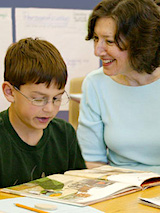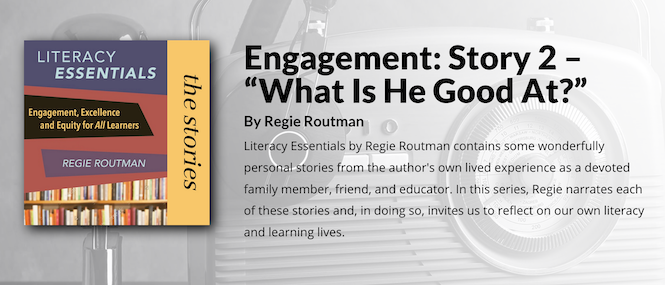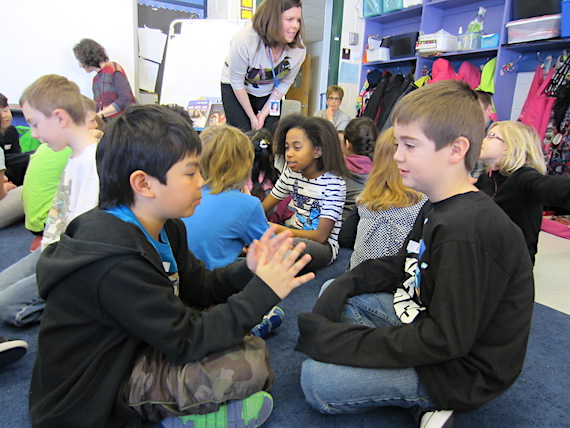Storytelling – The Heart of Teaching and Learning
I first became aware of the power of storytelling through my grandmother.
Although she never got beyond a sixth grade education, she had a gift for regaling me with fascinating stories about her life – growing up in a crowded apartment as one of seven sisters, choosing to marry for money instead of love only to lose that financial stability during the Great Depression, using her creative talents to design and make hats and jewelry as a way to support herself well into her 80’s.
These stories and others captivated me as a teenager; she was not just my beloved grandmother; she was storyteller extraordinaire!
There was also the large cardboard box of her written stories, mostly jottings on scraps of paper, that she secreted away in a bedroom closet and would take down to share with me whenever I visited overnight. She hoped one day to publish those stories but lacked the confidence, repeatedly telling me, “I’m not a real writer.” But, of course she was! Like our students and us, she just needed someone to encourage her that those stories mattered, not just to her but also to others.
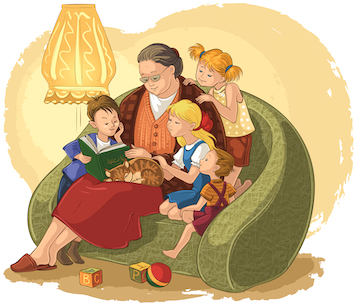
With a renewed focus today on supporting the growth of the whole child, personal storytelling is uniquely positioned to support that social-emotional growth that plays a pivotal role in preparing students for life readiness, whether that be college, career, or some self-chosen endeavor.
The story of Crystal
I will never forget getting to know Crystal, a ninth grade student struggling mightily with literacy and life issues. I met her through her remarkable language arts support teacher, Mary Beth Nicklaus, who was having great success encouraging students to write their life stories in their chosen genre as a way to improve their reading abilities.
With Crystal’s permission, Mary Beth began sending me some of Crystal’s poems, which were haunting yet beautiful. I felt so moved I wrote to Crystal expressing deep sadness and grief for all she’d been through but also noting that she wrote with “an unflinching heart and mind,” that her writing “reveals a very thoughtful, courageous young woman,” and that “You have a way with words; you are already a writer. Your honest words express clarity and great emotion.”
So began an extensive correspondence and caring relationship between a student and a learner-teacher. Crystal’s responses to my emails included, “I’m actually crying tears of joy” and “I have never been the one people talk nice things about.” When I said I’d be sharing one of her poems (with her permission) at a literacy conference, she wrote, “I can’t believe you are doing this. It’s like I walked into an alternate universe.”
Mary Beth remarked how Crystal had changed over the course of the school year: “Her writing and speaking grammar are improved. The way she carries herself and the way she speaks compared to when I first met her last year is awe-inspiring. I’m discovering she has a sense of humor and there is this grace that is coming through in her interactions that wasn’t there before.”
Stories lead us into new possibilities
When I wrote Literacy Essentials: Engagement, Excellence, and Equity, it was important to me to integrate personal and professional stories into the text, to make stories as necessary to the text as they are to living a full and happy life.
For our marginalized students and students from poverty, like Crystal, stories are a way in to “seeing” and “seeking” new possibilities in school and in life. That is as true for us as teachers and adult learners as it is for our students. That’s why I include professional stories that are also personal – such as, how I came to feel “smart” and my journey from a compliant teacher to becoming a knowledgeable and outspoken advocate for all learners, especially our underserved ones.
It took me a long time to believe my stories mattered, but my grandmother’s storytelling voice was whispering in my ear, “You can do this.” And you can do this too! No one has told your story in your own voice, speaking your truths. Our lived experiences and those of our students matter – a lot.
To make sure that “The Stories” maintain a special place of honor with the book Literacy Essentials, I recently proposed to Stephen Hurley, amazing educator and radio host who is also a valued colleague and treasured friend, that we collaborate on a Stories podcast. It was my good fortune that Stephen enthusiastically agreed and beautifully produced “Literacy Essentials: The Stories.”
You can find a description and listen to the series of 13 stories at this website or access them wherever you get your podcasts. Like Literacy Essentials itself, “The Stories” are divided into three categories: Engagement, Excellence, and Equity. For an example of one story in Engagement, click on the book image below and listen to “What is He Good At?”
Stories help us know our lives matter
My hope is that listening to my stories will encourage you, your students, and your families to tell and write your own stories. Stories validate us, humanize us, help us make sense of our lives, and show us what might be possible. Telling our stories is an act of bravery, celebration, and hope.
Let the storytelling begin! You might even try podcasting in your classrooms and school as a way to share and honor stories and build closer relationships with those you work with and care about.
For some terrific ideas and inspiration on storytelling, see, listen to and read:
- Award-winning author Chimamanda Ngozi Adiche, TED Talk, “The danger of a single story.” Found here.
- Dave Isey, founder of Story Corps, TED talk, “Everyone around you has a story the world needs.” Found here.
- The Moth: Visit this international storytelling project for stories and education ideas. Also see this article about Seattle’s Moth Story Slams and the secrets of great storytelling.
I’ve now had the privilege of spending a lifetime teaching, leading, mentoring, coaching, and learning alongside students, teachers, and leaders in underperforming schools across the United States and Canada. I’ve learned that trusting relationships are vital, that joy in our work is possible and necessary, and that literacy and life essentials are inseparable.
I’ve also learned that teaching must be a responsively human endeavor; we teach readers, not just reading; we teach writers, not just writing. The content we teach and the texts students read and write must be relevant, rich, culturally inclusive, and connected to real-world issues and first-rate literature and resources.
Standards, testing, and programs will continue to challenge us, but if we are professionally knowledgeable, we can be steadfast in prioritizing students’ strengths, needs, and interests before any mandate.
Students – and all of us who live and breathe – need to know that our lives matter, that we are uniquely human, and that change is possible. Telling our stories acknowledges who we are as we speak truths to our setbacks and our successes, our heartbreak and our hopes.
In so doing, we affirm and celebrate our past, current, and future selves with heightened self-awareness, courage, and dignity. Storytelling is distinctively suited to these worthy ends. And to new beginnings.
______________________________________________
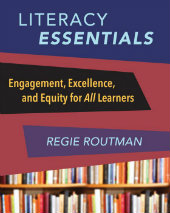
Here at MiddleWeb, Literacy Essentials has been reviewed an unprecedented four times by our contributors. Check out reviews by teacher and curriculum leader Sarah Cooper, literacy coach Pam Hamilton, improvement specialist Deana Jones, and principal Rita Platt.

